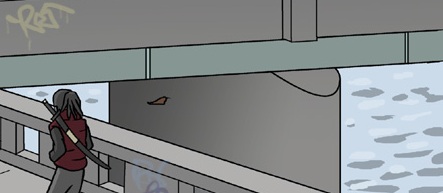
Robert Pinero urban samurai art
“It’s comforting to believe that there’s an essential version of each of us — that good people behave well, bad people behave badly, and those tendencies reside within us.
“But the growing evidence suggests that, on some level, who we are — litterbug or good citizen, for example — changes from moment to moment, depending on where we happen to be.”
The preceding quote is from Adam Alter’s NY Times opinion piece, “Where We Are Shapes Who We Are.” For a while now, I’ve been writing about the silver lining of so called “bad” neighborhoods — that they can make for a certain kind of strength — but I may have only delved a bit into the thug culture that pervades in some of those neighborhoods. This was probably because an abundance of people of color in a given neighborhood unduly makes for a bad place to live in the culture at large, even though most of any such people aren’t “thugs” at all. Beyond a “black people are scary/cool” mentality, the Alter piece got me thinking about the role that location has in the way thug culture plays out — and also in the way that people extend themselves.
There is no greater fulfillment of the way that African-Americans have been disenfranchised than thug culture. For the past century and a half, black people migrated to the north in a search of less discrimination and more opportunities — but, by and large, found themselves being looked over for working-class jobs (pretty much decreasing in number the more there was an emphasis on valuing employees as people). Historically, such jobs have been the starting point for families to become middle-class and gain some sense of mobility. With the people providing those jobs vastly preferring people who looked like themselves, African-Americans, already dealing with the psychological scars of being treated as less than human, typically had to reside in locations redlined by a population that fled to suburbs and various other enclaves. It’s not an easy place to be (literally and existentially), and if you didn’t have much of a value system internally in the first place . . . well, it’s always easy to embrace mindlessness.
When hip-hop first emerged in crowded, urban black enclaves, it was something that was against hopelessness — much in the same way that rhythm and blues was when it came out of the backwoods of black southern life. But that was then (and to be fair to what’s labeled as hip-hop presently, it’s the corporate stuff that’s the most mindless), and this is now, when what sets the tone is bass-thumping self-aggrandizement.
In his opinion piece, Alter mentions various studies that postulate that people who live in less densely populated areas are nicer–essentially, more likely to extend themselves. Urban areas are defined by how crowded they are in relation to surrounding areas; gentrification by whom it thins out. If you’re in some densely urban place that’s not gentrified (or maybe only a little), and you still haven’t succumbed to apathy and a hard heart, that’s really something, isn’t it? Just because it’s easier to be selfish where there’s less resources doesn’t mean it’s natural to the locale. In a world with a population that’s becoming increasingly urban because such is where the opportunities are, it seems to me it’s not all that much to only be able to find kindness where it’s less crowded, less noisy and where the streets are less cracked.
 Thinking too much is a double-edged sword. Wait, aren’t all swords double-edged? I’m no expert, but … never mind. You see, thinking too much.
Thinking too much is a double-edged sword. Wait, aren’t all swords double-edged? I’m no expert, but … never mind. You see, thinking too much.
